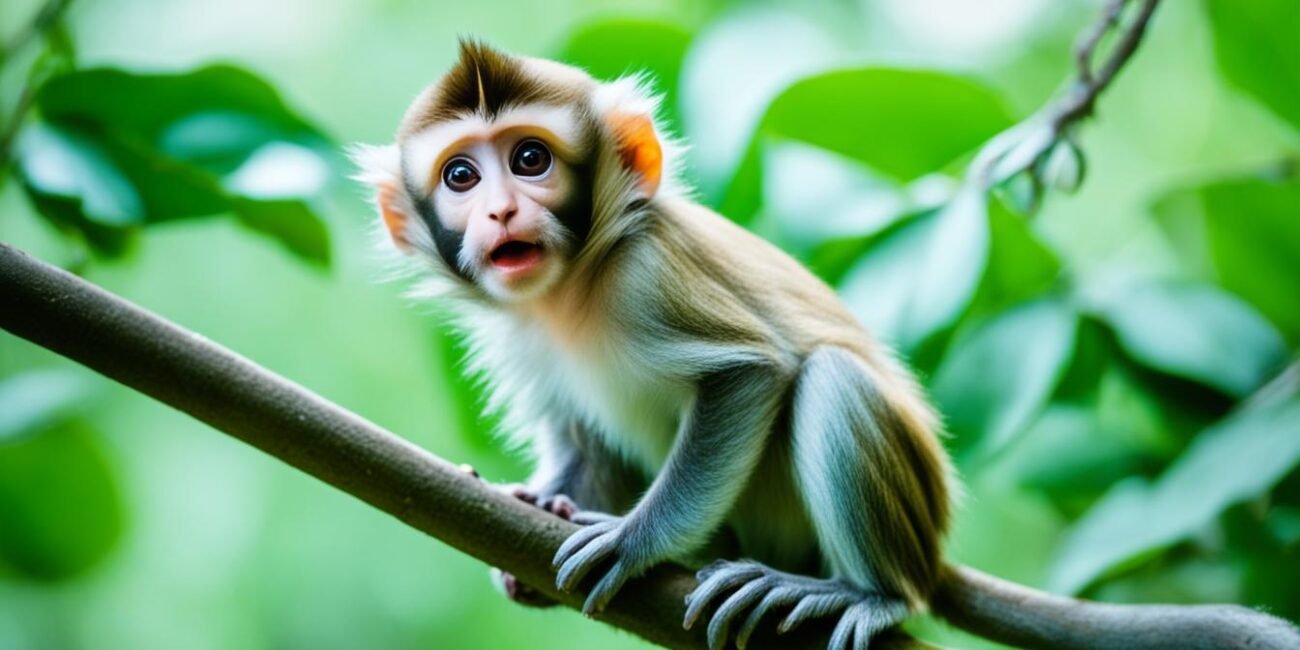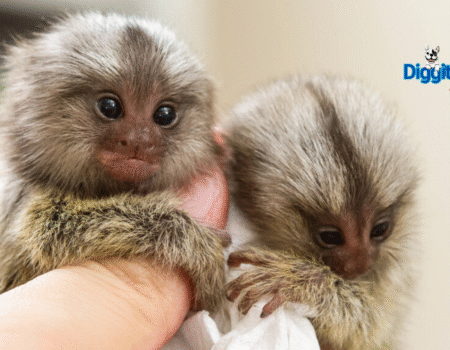Welcome to our comprehensive guide on caring for tiny pet monkeys. Whether you are interested in adopting a miniature pet monkey or already have a small pocket-sized companion, this article will provide you with essential information on pet monkey care. From where to buy a tiny monkey to creating a suitable environment, we’ve got you covered.
Tiny pet monkeys, also known as pygmy marmosets or finger monkeys, are the smallest species of monkey in the world. With their adorable appearance and intriguing nature, these exotic pets have gained popularity among animal enthusiasts. However, it’s important to note that owning a pet monkey requires legal considerations and specific care to ensure their well-being.
In this guide, we’ll discuss the basics of what a finger monkey is, their natural behavior, the challenges of keeping them as pets, and how to provide the best care for your tiny monkey companion. Let’s dive in!
What is a Finger Monkey?
Finger monkeys, also known as pygmy marmosets, are the smallest primate in the world. These adorable monkeys are treetop dwellers and can grow up to 6.2 inches in length. They are called finger monkeys because they are small enough to cling to a human finger. Finger monkeys are social creatures and live in small groups consisting of an adult male, adult female, and their offspring.
These tiny monkeys are known for their long, narrow teeth and sharp nails, which allow them to feed on sap and support themselves vertically on trees. They have perfected their tree-climbing skills and are well-adapted to life in the rainforest canopy. However, they also face numerous predators in their natural habitat, including snakes, cats, and raptors.
“Finger monkeys, also known as pygmy marmosets, are the smallest primate in the world.”
| Key Features | Description |
|---|---|
| Size | Up to 6.2 inches in length |
| Habitat | Treetop dweller in South American rainforests |
| Behavior | Social creatures living in small family groups |
| Diet | Feeds on sap and other tree exudates, along with insects and fruits |
| Predators | Snakes, cats, raptors, and other rainforest predators |
Despite their tiny size, finger monkeys exhibit fascinating behaviors and have captivated the hearts of many animal lovers. Their unique characteristics and adorable appearance make them highly sought after as pets, and they are often available for sale from reputable breeders.
Next, we will explore the life of a finger monkey, including their lifespan, behavior, diet, and predators.
The Life of a Finger Monkey
Finger monkeys, also known as pygmy marmosets, live in small social groups. In the wild, their average lifespan ranges from 12 to 16 years, while in captivity, they can live up to 15 to 22 years. These tiny primates are cared for by the male members of the group for the first two weeks of their lives.
Finger monkeys have unique physical characteristics that enable them to survive in their natural habitat. With long, sharp nails and narrow teeth, they can easily feed on sap, resin, gum, and vines of trees. Additionally, finger monkeys have a varied diet that includes small insects, butterflies, spiders, and fruit.
Being social creatures, finger monkeys engage in various activities throughout the day. They spend their time feeding, foraging, grooming, and playing with their group members. Finger monkeys have remarkable leaping abilities and use vocalizations to communicate with their peers and defend themselves against predators.
Finger Monkey Lifespan
The average lifespan of finger monkeys in the wild is 12-16 years, while those in captivity can live up to 15-22 years.
Finger Monkey Behavior
Finger monkeys are active during the day and engage in activities such as feeding, foraging, grooming, and playing. They use vocalizations and leaping abilities to communicate and defend themselves against predators.
Finger Monkey Diet
Finger monkeys have a diverse diet that includes sap, resin, gum, vines, small insects, butterflies, spiders, and fruit.
Finger Monkey Predators
Finger monkeys have a range of predators in their natural habitat. These include snakes, cats, and raptors.
Can I Keep a Finger Monkey as a Pet?
Keeping a finger monkey as a pet requires careful consideration. It’s important to be aware of the legality surrounding pet monkeys in your state or country, as regulations vary. Many locations prohibit the private ownership of monkeys or require specific licenses and permits. Before deciding to bring a finger monkey into your home, it’s crucial to do thorough research to ensure you can provide a legal and suitable environment for them.
Finger monkeys are wild animals and, like any wild animal, they can exhibit aggressive behavior. This is especially true as they reach sexual maturity. Finger monkeys have sharp teeth and can bite, making them difficult to handle. Additionally, when they feel threatened or angry, they may throw their feces. To avoid these issues, finger monkeys require extensive training and socialization from a young age to develop good behavior habits.
It’s recommended to keep finger monkeys in pairs or with other monkeys to provide proper socialization. They are highly social animals and thrive when they have companionship. By keeping them with other monkeys, they can interact, play, and learn from each other, which promotes their overall well-being.
“Keeping a finger monkey as a pet requires understanding their natural behavior and providing the appropriate care and environment. It’s important to consult with experts and ensure you can meet the specific needs of these fascinating primates.”
Bringing a finger monkey into your home as a pet requires a high level of commitment, both in terms of time and resources. They have complex needs and require a significant amount of attention and care to ensure their well-being. Consider consulting with a primate specialist or veterinarian who has experience working with exotic animals to get expert advice on how to provide the best care for your pet finger monkey.
Finger Monkey Aggression
It’s important to note that while finger monkeys can display aggressive behaviors, this doesn’t mean they are inherently aggressive animals. Their aggressive tendencies can be managed through proper training, socialization, and understanding their needs. By providing a suitable environment and meeting their physical, mental, and social requirements, you can greatly reduce the likelihood of aggressive behavior in your pet finger monkey.
How to Care for a Pet Finger Monkey
To properly care for a pet finger monkey, it is crucial to create a monkey-friendly environment that mimics their natural habitat. This includes providing a spacious cage with trees, vines, water sources, and swings for them to climb and play. If direct sunlight is not readily available, artificial light sources can be used to ensure they receive proper lighting.
The diet of a finger monkey should consist of a variety of fruits, vegetables, and protein sources. Monkey biscuits can be a great addition to their diet as well. As babies, finger monkeys should be fed every two hours. It is important to follow a proper feeding schedule to ensure their growth and development.
In addition to a suitable environment and a balanced diet, regular veterinary care is essential for the well-being of pet finger monkeys. Finding a veterinarian who specializes in primate care is crucial to providing the necessary vaccinations and check-ups to keep your finger monkey healthy and happy.
Creating a Monkey-Friendly Environment
When designing the perfect environment for your pet finger monkey, consider the following:
- Provide a spacious cage with ample room for climbing, swinging, and playing. Ensure it is secure and escape-proof.
- Include trees, vines, and branches within the cage to replicate their natural habitat. This allows them to exercise their climbing abilities.
- Add water sources, such as small bowls or water bottles, for them to drink and bathe in. Clean and refill these regularly.
- Offer swings and toys for mental stimulation and entertainment. Finger monkeys are intelligent creatures that need activities to keep them engaged.
- Consider adding live plants and vegetation to create a more natural and stimulating environment.
Remember, a monkey-friendly environment ensures the physical and mental well-being of your pet finger monkey. Invest time and effort into creating a space that allows them to exhibit their natural behaviors and live a fulfilling life.
Finger Monkey Diet
A well-balanced and nutritious diet is vital for the health of your pet finger monkey. Here are some key points to keep in mind:
- Offer a variety of fresh fruits and vegetables to provide essential vitamins and minerals.
- Include protein sources such as monkey biscuits or pellets to meet their dietary needs.
- Avoid sugary or high-fat foods, as they can lead to health issues.
- Ensure fresh water is readily available for drinking and bathing.
- As a baby, finger monkeys require frequent feeding every two hours. Gradually adjust the feeding schedule as they grow.
Consulting a veterinarian who specializes in primate care can provide valuable guidance on the specific dietary needs of your pet finger monkey.
Veterinary Care for Finger Monkeys
Regular veterinary care is essential to maintain the health and well-being of your pet finger monkey. Find a veterinarian who specializes in primate care and ensure the following:
- Schedule regular check-ups to monitor their overall health and detect any potential issues early.
- Follow the recommended vaccination schedule to protect against common diseases.
- Seek professional advice for any behavior changes, signs of illness, or unusual symptoms.
- Keep up with parasite prevention, such as flea and tick control.
Veterinary care plays a crucial role in ensuring the longevity and happiness of your pet finger monkey.
| Aspect of Care | Key Considerations |
|---|---|
| Environment | – Provide a spacious cage with trees, vines, water, and swings. – Replicate natural habitat with live plants and vegetation. – Ensure access to natural or artificial light sources. – Create a secure and enriching environment for climbing and play. |
| Diet | – Offer a variety of fruits, vegetables, and protein sources. – Include monkey biscuits or pellets for essential nutrients. – Avoid sugary or high-fat foods. – Provide fresh water for drinking and bathing. – Follow feeding schedules appropriate for different life stages. |
| Veterinary Care | – Find a veterinarian specializing in primate care. – Schedule regular check-ups and vaccinations. – Seek professional advice for any concerns or changes in behavior. – Maintain parasite prevention measures. |
How Much Do Finger Monkeys Cost?
When considering the cost of owning a finger monkey, it’s essential to factor in the initial investment as well as ongoing expenses. The starting price for a finger monkey, including the necessary cage and supplies, can range from $1,500 to $8,000, depending on the breeder and the age of the monkey. However, it’s important to note that the cost of a finger monkey goes beyond the purchase price.
Owning a pet monkey is a significant financial commitment, as they require proper care, food, and veterinary expenses throughout their lifespan. Regular veterinary check-ups and vaccinations are essential to ensure the health and well-being of your finger monkey. Additionally, their diet should consist of a variety of fruits, vegetables, and protein sources, which can add to the overall cost of ownership.
When purchasing a finger monkey, it is highly recommended to only buy from reputable breeders who provide health guarantees and have a good reputation. This ensures that you are getting a healthy and well-cared-for monkey.
| Expense | Estimated Cost |
|---|---|
| Finger Monkey Purchase | $1,500 – $8,000 |
| Cage and Supplies | Varies |
| Food and Treats | Varies |
| Veterinary Care | Varies |
| Total | Varies (depending on ongoing expenses) |
Keep in mind that the cost of owning a finger monkey extends beyond the initial investment. It’s crucial to budget and ensure that you can provide the necessary care and resources for your pet monkey throughout its life.
Understanding the Different Monkey Breeds
When considering a pet monkey, it is important to understand the different breeds and their unique characteristics. Some popular monkey breeds kept as pets include capuchin monkeys, spider monkeys, marmosets, and squirrel monkeys.
Capuchin monkeys: Known for their intelligence and trainability, capuchin monkeys are highly adaptable and have a mischievous nature. They require mental stimulation and regular training to thrive as pets.
Spider monkeys: Energetic and lively, spider monkeys are known for their long limbs and prehensile tails. They are highly active and require ample space to move and play.
Marmosets: These small and social monkeys are a popular choice for pet owners. They are active, curious, and enjoy spending time with their human caregivers. Marmosets thrive in pairs or small groups.
Squirrel monkeys: Friendly and sociable, squirrel monkeys are known for their playful nature. They enjoy living in social groupings and need companionship to lead a fulfilling life.
Each breed has different care requirements, so it is essential to research the specific breed thoroughly before making a decision. Understanding their unique characteristics and needs will help you provide the best care and environment for your pet monkey.
Monkey Care Requirements
Pet monkeys require specific care to ensure their well-being. It is crucial to provide them with a balanced diet that includes a variety of fruits, vegetables, protein, and occasional nuts. This can help meet their nutritional needs and promote overall health. Regular meals and proper portion control are essential to prevent overfeeding or nutrient deficiencies.
In addition to a nutritious diet, socialization is vital for pet monkeys. These highly social animals thrive on interaction with both humans and other monkeys. Spending quality time with your monkey, engaging them in play, and providing opportunities for social interaction can help fulfill their social needs and prevent behavioral issues.
Creating a monkey-friendly environment is crucial for their physical and mental well-being. This includes providing a large enclosure that allows for climbing, exploration, and natural behaviors. Adding tree branches, platforms, and swings can provide enrichment and mimic their natural habitat.
Regular veterinary care is essential for maintaining the health of pet monkeys. Finding an exotic animals veterinarian with expertise in primate care is recommended. Regular check-ups, vaccinations, and preventative measures can help prevent and detect any potential health issues early on to ensure prompt treatment and a longer, healthier life for your pet.
Overall, proper care, a balanced diet, socialization, and regular veterinary check-ups are key in providing a happy and fulfilling life for your pet monkey.
Dietary Guidelines for Pet Monkeys
| Food Group | Examples |
|---|---|
| Fruits | Apples, bananas, grapes, oranges |
| Vegetables | Carrots, broccoli, spinach, kale |
| Protein | Eggs, lean meats, legumes |
| Nuts | Almonds, cashews, walnuts |
Remember to provide fresh, clean water at all times and avoid feeding your monkey any toxic or harmful foods. Consult with your veterinarian for specific dietary recommendations based on your monkey’s breed and individual needs.
“Proper diet and socialization are crucial for the well-being of pet monkeys. By providing a balanced diet and a nurturing environment, you can ensure a happy and healthy life for your monkey companion.”
Creating a Monkey-Friendly Environment
When it comes to keeping pet monkeys, creating a monkey-friendly environment is crucial for their overall well-being and happiness. One of the key aspects is providing a spacious enclosure that allows for natural movement and exploration. A monkey enclosure should have climbing structures, platforms, and perches, providing ample opportunities for physical exercise and mental stimulation.
In addition to the essential components of the enclosure, it is also important to include monkey toys to keep them engaged. Monkey toys can vary from puzzle feeders to ropes and swings, offering both physical and mental challenges. These toys help prevent boredom and encourage natural behaviors.
Another crucial part of a monkey-friendly environment is socialization. Whether through human interaction or interaction with other monkeys, socialization is essential for their emotional well-being. Spending quality time with your pet monkey and offering them companionship can greatly enrich their lives. If possible, allowing them to interact with compatible monkey companions can further enhance their social skills.
Regular and proper veterinary care is vital for the overall health of pet monkeys. Just like any other pet, monkeys require routine check-ups and vaccinations to stay healthy. Finding a veterinarian with expertise in primate care is essential for providing the necessary veterinary attention and care your pet monkey needs.
By creating a suitable environment that includes a monkey enclosure, engaging toys, socialization opportunities, and access to proper veterinary care, you can ensure that your pet monkey thrives and enjoys a happy and fulfilling life.
FAQ
What is a finger monkey?
A finger monkey, also known as a pygmy marmoset, is the smallest primate in the world. It is a tiny monkey that lives in the treetops of South American rainforests.
How long does a finger monkey live?
Finger monkeys have an average lifespan of 12-16 years in the wild and 15-22 years in captivity.
Can I keep a finger monkey as a pet?
Keeping a finger monkey as a pet requires careful consideration due to legal restrictions in many locations. Finger monkeys are wild animals and can display aggressive behavior, especially as they reach sexual maturity.
How do I care for a pet finger monkey?
To care for a pet finger monkey, it is important to create a monkey-friendly environment that replicates their natural habitat. This includes providing a large cage with trees, vines, water, and swings. Their diet should include a variety of fruits, vegetables, and protein sources. Regular veterinary check-ups are also necessary.
How much does a finger monkey cost?
The cost of a finger monkey can range from $1,500 to $8,000, depending on the breeder and the age of the monkey.
What are the different monkey breeds?
Some popular monkey breeds kept as pets include capuchin monkeys, spider monkeys, marmosets, and squirrel monkeys.
What are the care requirements for pet monkeys?
Pet monkeys require a balanced diet of fruits, vegetables, and protein, along with regular socialization with humans. They also need a spacious enclosure with climbing structures and regular veterinary care.
How do I create a monkey-friendly environment?
To create a monkey-friendly environment, provide a large enclosure with climbing structures, platforms, and toys for mental stimulation. Vegetation and live plants can also be added. Regular socialization and veterinary care are essential.










No Comment! Be the first one.